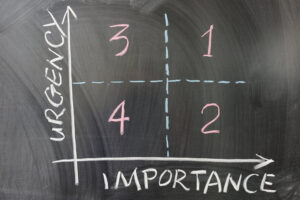Every event planner knows that you need to be organized right down to the last detail for your event to run smoothly. And there are countless details! Right from pre-planning to the day of the event, there’s so much you need to remember. Keeping all the information in your head will undoubtedly cause errors and chaos.
To simplify event planning, event planning checklists can make all the difference. Unfortunately, event checklists will vary for each event as no two will be identical.
To make it so that you can run a smooth and well-organized event, we’ve gotten hold of the ultimate event planning checklist. This checklist created by our team at Trafft, covers multiple stages of your planning process. Use these event checklists for each stage and know that you’ve got everything covered. with these, you can be sure you are planning meticulously to create the perfect event.
The Devil is in the Details

The old saying ‘the devil is in the details’ is definitely true for event planning. All event planners know that if you forget one seemingly minor detail, it can throw off a whole range of things.
Whether you’re an experienced event planner or a complete beginner, event planning checklists will help you be amazing at your job.
As you think of things you need to do, put them on your event planning checklist template. You may prefer to make your own, but you can also find some online.
With a million things to remember, a checklist will be the one place reminding you of anything you may have forgotten. On the day and in the lead up to an event, it will be a total lifesaver. If you need a how-to guide for making an event checklist, read on!
Plan, Plan, Plan!

A lot of people ask, ‘what is the best time to start working on an event?’. They want to know how early is too early. Well, there’s no such thing as too early when it comes to event planning. You want to be as prepared as you can be on the day of, so start planning as soon as you know about the event.
While you may be a whiz at project management, that doesn’t mean you don’t need a little help to stay on track.
Start off by answering these questions and you’ll be well on your way to start planning your event. Every event planning checklist template should contain these questions. These are the very first things you need to decide on in the event planning process.
Don’t forget that if you’re a professional event planner, you may first have to create an amazing business proposal to land the gig.
You can use Qvidian to streamline this process. It's worth exploring Qvidian competitors for tools that better fit your workflow.
Answer these questions to start planning your amazing event:
- When will this event happen? Choose a date and time, accounting for attendees’ availability. This may also depend on things such as season and company.
- Where will this event happen? Which city is the most suitable? Are there venue preferences? You may be limited by budget or guest numbers. Add research, meet with vendors, view venues and create a contract to your checklist.
- What type of event is this? Conferences and parties would, of course, be planned differently.
- What does this event hope to achieve? Is it a celebration? Fundraising? The purpose could be any number of things but having a clearly defined purpose is paramount to the success of the event.
- What are the objectives of the event? This is similar to the above point but be more specific. How will you know if you achieved the event goal? As an example, maybe a company wanted 50 new customers, or your client needed to fundraise $2,000.
- Who is the audience for this event? Of course, the audience matters – what will they like? What do they respond to? Putting time and effort into this will make the event more likely to reach its goal.
Three-To-Six Months Before the Event
Now that you’ve answered the basic questions on the event checklist template, it’s time to get into specifics. Round up your event speakers, sponsors, and partners. You may also need to build an event website, depending on the type of occasion. For example, if it’s a conference, guests should be able to register online. Once that is set up, you can start advertising your event.
Next steps to add to your event planning checklist:
Speakers
- Research possible speakers
- Contact speakers and discuss payment (if applicable)
- Book speakers
- Write speaker contract (if applicable)
- Give speaker brief
- Confirm travel and accommodation arrangements
- Get speaker bio
Selecting the speakers for an event can make or break it (no pressure!). Choose speakers that you know to speak well and are knowledgeable about the necessary topic. With speakers to contact, accommodation to book and briefs to write, it can be hard to keep track of everything. Luckily, some aspects of this process can be automated. For example, you could ask speakers to upload or update their own bios in a special section of your website.
Create an Event Website

Image source: MH Sunny
Creating a website for the event is your next step after confirming speakers and selecting a venue.
On this site, the attendees should be able to find all the event info they need and register. You may be working with an agency to handle registrations, but if not, you can follow the below event checklist template suggestions.
- Use an event ticketing and registration platform to set up your event.
- Create an event page on your own website.
- Run the page past your client for any changes.
- Build the event site.
- Make sure when creating the site that it will work on mobile.
Advertising Your Event

Of course, what you need now is people to come to your event! You need to consider what your value proposition is. What is it about your event that will make guests want to come? How do you appeal to the type of guest that you really want?
Here are some steps to start advertising your event:
- Create branding material aligned with the message of the event
- Decide whether to give a discount for early registration
- Create a promotional video
- Use email and social media marketing
- Put your event out on event calendars
- Write blog posts for your event site
As social media is a daily part of many peoples’ lives, it’s an invaluable marketing tool. Unfortunately, 51% of event planners admit that they find it hard to use it effectively for event marketing.
Budgeting
With the myriad of expenses, your event will incur, it can seem impossible to corral them all into a budget. However, if you use a spreadsheet on Microsoft Excel, this can make it much easier. There are plenty of event planning checklist templates that Excel offers. You’ll want to group your expenses into a few main categories. These may include venue, equipment, catering, and speakers. Then under each category, detail all expenses you might expect.
In this part of your event planning checklist, you may want to:
- Compare equipment costs
- Get catering quotes
- Negotiate costs
- Pay deposits
One-To-Three Months Before the Event
At this stage, your event planning should be well underway. Preparing for the event is probably taking up a large chunk of your time.
Here are some steps you should be completed at this stage:
- Plan your next advertising – this could include email and snail mail marketing. By now you should have these materials created and ready to send whenever you have the attendee contact list.
- Order equipment – order your equipment with plenty of time to spare to avoid last-minute stress. First of all, order marketing materials. If you don’t have these until the day, they are basically useless. Get them as soon as possible.
- Hire services – create contracts for catering, internet and anything else you might need.
- Giveaway items – it can be a great idea to order a promotional product with the event logo on it. This can attract people to your stall if you’re in a booth situation. It’s best to get quotes for these early so you have time for mockups.
1 Week Prior to the Event

It’s almost here! You should have the brunt of the work done by this point. You will hopefully be on to confirming and double-checking, for example:
- Confirm venue details
- Approve catering menu
- Receive AV equipment
- Finalize security plan
- Receive event signage
- Finalize schedule for the day of the event
- Brief hosts/guests/speakers or anyone else with a role on the day
- Provide final numbers to the caterer
- Copy any presentations or anything else to give to guests or speakers
- Ensure the room set up is wheel-chair accessible
- Create name badges and attendee list
Have a meeting to show everyone your master plan and confirm the details. You will need back up plans in place, in case of any changes.
Organize a Walk-Through
Actually going to your event venue and conducting a site walk-through will greatly help you. This will make sure that every detail is thought through. For example, you may have a seating plan drawn out, but on arriving at the venue, you realize it blocks a fire exit! Better to realize this during the walk-through the week before than on the day of an event.
Send reminders
- To speakers
- To vendors
- To attendees
- To sponsors
Event Planning Checklist for the Day Of
Finally, it’s the day of the big event! It’s all going down today, and you know you’ve nailed the planning thanks to your meticulous event planning checklists.
Remember to:
- Check the cleanliness of the restrooms and venue
- Check-in with vendors that they are good to go
- Check that all the equipment is in the right places
- Check that the Wi-Fi is working
- Go over your schedule with the team
The Day Of – What Else?
You’ll usually have created two schedules for the day of. One agenda is for attendees, which offers a general plan only. Then you’ll have a much more detailed one which is just for your event team. This one will have all the details of when to move equipment when to set up catering and much more.
The event planning sheet for your team might resemble this one:
7:30 am: You arrive and begin setup
7:45 am: AV arrives and tests sound and light
8:00 am: Tables get setup
8:10 am: Guests start to arrive
8:15 am: Guests are let in
8:30 am: Breakfast served
9:10 am: MC begins proceedings
9:15 am: Keynote speaker starts
9:50 am: Morning tea snacks set out
10:10 am: Morning tea break
10:30 am: Speakers go to breakout rooms
10:40 am: The first session begins
This schedule can be as detailed as you like to ensure clarity with your team. This will help everything go to plan on the day. You should consider giving this plan to the caterers, venue staff, and anyone else involved.
After the Event
The event might be over, but your plan is not. You need to update your budget according to the actual costs, send post-event follow-ups and evaluate your event.
Here are some other things you might consider adding to your event planning sheet:
- Contact the venue to make sure you didn’t leave anything there
- Update your budget with all exact amounts from your receipts
- Gather final attendee numbers
- Send thank-you letters to speakers, sponsors and anyone else relevant.
FAQs about event planning checklists
1. What are the most important items to include in an event planning checklist?
Important tasks like choosing a location, making a guest list, setting a budget, finding caterers and entertainment providers, and setting up transportation and lodging should all be on an event planning checklist. Tasks like registration, post-event follow-up, and event promotion and marketing should also be included.
2. How far in advance should I start working on an event planning checklist?
Particularly for larger events, it is advised to begin creating an event planning checklist at least six months prior to the event date. This gives you enough time to choose a location, suppliers, and lodging, as well as to successfully sell and promote the event. The length of time can change, though, depending on how complicated and big the event is.
3. How can I make sure I don't forget any important details when creating an event planning checklist?
Participating in the planning process with others, such as your team, volunteers, or event planning experts, is one method to make sure no crucial aspects are overlooked. To be sure you're covering every important detail, you can also consult templates or sample checklists. Moreover, make sure to routinely review the checklist and amend it as necessary.
4. Should I create separate checklists for different aspects of the event (e.g. venue, catering, entertainment)?
The planning process can be streamlined and made simpler to handle by making distinct checklists for various components of the event. This enables you to concentrate on certain activities rather than letting the sheer volume of things on a single checklist overwhelm you. To make sure nothing is missed, combine all of the individual checklists into a single master checklist.
5. What are some common mistakes to avoid when creating an event planning checklist?
One frequent blunder is failing to plan for unforeseen problems that might occur during the event. Another is failing to allow enough time for specific tasks, including choosing a location or negotiating with vendors. Also, it's critical to pay attention to minor elements like signage and electrical outlets.
6. How often should I update my event planning checklist?
As the planning process advances, it's a good idea to update the event planning checklist frequently. This guarantees that tasks are added and checked off when they are performed. Also, regular updates make it simpler to inform all parties involved in the planning process of developments.
7. What tools or software can I use to create and manage my event planning checklist?
There are numerous software and platforms for event planning, including Trello, Asana, and Google Sheets. Checklists and task management elements are also included in certain event management software. Choose a tool based on your demands and workflow.
8. How can I delegate tasks to others on my team using the event planning checklist?
Planning an event requires assigning tasks to others. Provide team members with precise tasks and due dates, and make sure they are aware of their duties. To make sure that everyone is following the same directions, it's crucial to communicate frequently and give precise instructions.
9. What is the best way to prioritize tasks on an event planning checklist?
Tasks on a checklist for event planning should be prioritized according to their significance and urgency. Important chores, such as obtaining the venue or catering, should be prioritized before non-essential elements. Prioritization can also be aided by breaking the event down into smaller components and concentrating on each one separately.
10. How can I stay organized and on track when working through my event planning checklist?
Working through an event planning checklist while staying organized and on schedule is essential. Project management tools, regular team communication, and breaking the event down into smaller parts can all help keep things on track. Also, it is possible to prevent surprises and guarantee that everything is taken care of by frequently reviewing the checklist and making the required modifications.
If you enjoyed reading this article about using an event planning checklist, you should read these as well:
- The Business Consulting Software You Need to Succeed
- The Best Event Scheduling Software You Need for Event Organizers
- How to Build a Recording Studio to Rent it on the Market






